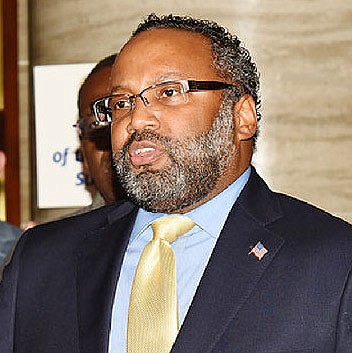A report is not enough. Actions must be taken.
That's the message the Coalition for Fair Policing delivered Monday after Friday's release of Missouri Attorney General Josh Hawley's annual vehicle stops report, which showed that black drivers were 85 percent more likely than white drivers to be stopped by law enforcement officers in Missouri.
"I am loathed that Missouri should still be the homeland for Jim Crow," said Nimrod Chapel Jr., president of the Missouri State Conference of the NAACP. "Something has to be done. I know many officers around the state personally and have talked to many others, but unfortunately the numbers keep going up in many jurisdictions. The NAACP is looking at not only how data is collected and what it says, but also at the people charged with ensuring that everyone is protected equally."
For now, Chapel said, the NAACP will keep its travel advisory in place for Missouri. Issued last year, the advisory says that if you travel or live in Missouri and are a person of color, a woman, or perceived as a person of faith or disabled, then you could be treated differently.
"The moral crisis is that the welfare of the people is the supreme law, but it's not a law for all people," said the Rev. Kim Woodruff with Missouri Faith Voices, a multi-racial, multi-faith and non-partisan group. "African Americans are twice as likely to have incomes below the federal poverty rate, and many times vehicle stops result in black and brown people being ticketed for minor violations and they go unpaid because of income constraints. That leads to arrests and bonds to get out of jail."
Chapel said he plans to talk with Gov. Mike Parson, a former sheriff, about how to rectify the situation.
"These are large complicated problems that can't be solved in an hour, but we are anxious to talk to him," Chapel said.
He also noted: "I'm asking (Attorney General Hawley) to have some comprehensive plan to treat all Missourians equally and fairly, but so far I've not seen anything from his office."
"It's an important issue that deserves discussion," Hawley Spokesman Mary Compton said. "Within the guidelines given by the Legislature, we are implementing changes to the survey that provide new insights for local law enforcement agencies and policymakers."
Chapel, a Jefferson City resident, said he was pleased that the further analysis of the report done by Empower Missouri - advocating for the state to become more just and equitable - shows that while improvements are still needed, the Jefferson City Police Department and Cole County Sheriff's Department are making positive strides.
"Our numbers did not rise compared to the rest of the state. In fact, we saw a little dip," he said. "That's through the effects of officers who care and are trying to do something about it. It's also about having good communications with the departments and the community. All agencies need to have a dialogue about what policing means to the public, as well as what it means from the standpoint of having to do the job and where those two intersect - because our goals are really the same."
Don Love, co-chair of the Empower Missouri Human Rights Task Force, has been analyzing the attorney general's report for the last 10 years. He focuses on what the officer does after a stop has been made because it's not dependent on estimates of drivers based on Census data but based on the number of stops for each group, he said.
"Consent searches are useful indicators of how well officers focus on significant facts or are distracted by racial stereotypes," he said. "The request for consent occurs after the officer and driver have been face to face. The officer has settled the reason for the stop and does not choose to conduct a search based on probable cause."
In looking at the 3,068 traffic stops Cole County deputies made last year, Love said, there was a 0.98 disproportion rate for citations given to black drivers. In their analysis, anything close to one is considered equity, he said. If it's higher than one, black people are considered overly affected. At lower than one, white people are overly affected.
In Jefferson City, with 15,652 traffic stops, the citation disproportion was 1.13 percent for black drivers, which Love said indicates to him there was not a major problem.
"If there are a lot of warnings given or 'no action' stops, it would raise the question if the officer made the stop in the first place - stopping people for things they shouldn't be stopped for," Love said. "That doesn't seem to be a major issue (in Jefferson City and Cole County)."

